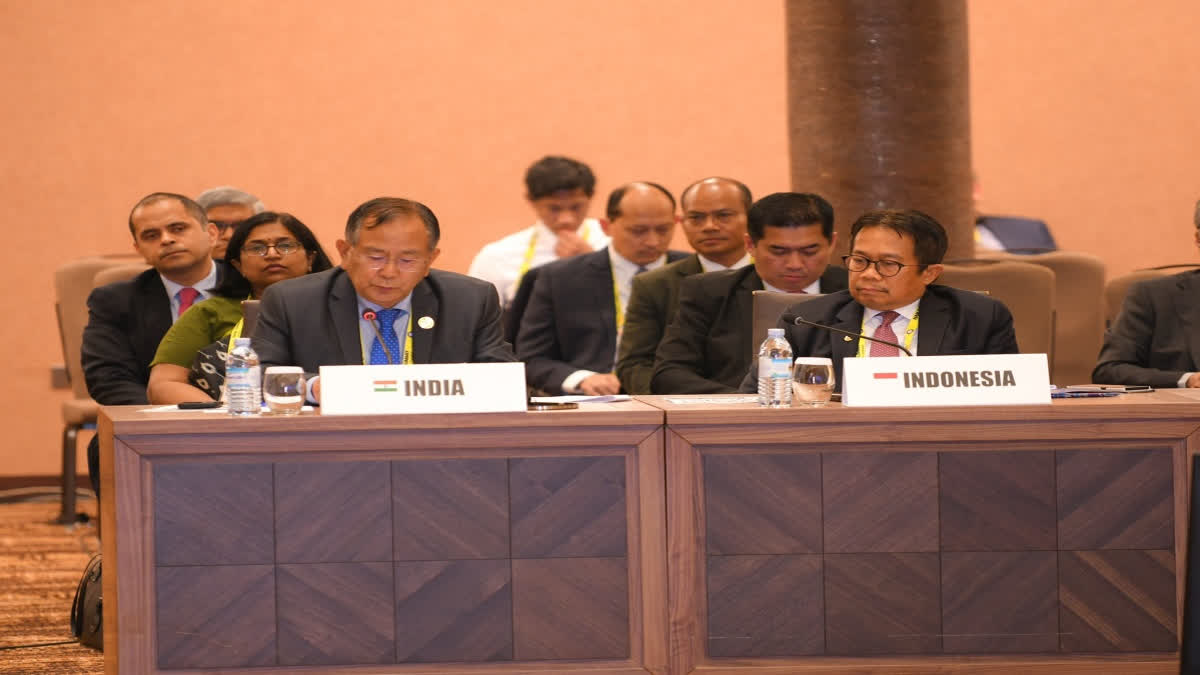New Delhi: India on Wednesday slammed Pakistan after Islamabad raked up the Kashmir issue at the ministerial segment of the 19th summit of the Non-Aligned Movement in Uganda.
Addressing the summit, Minister of State in the Ministry of Externa Affairs Rajkumar Ranjan Singh said, "While our focus is on coming together to strengthen NAM collectively, we have been exposed to the unfortunate, misplaced, predictable, and blatant misuse of this august platform by Pakistan, as it propagates false and malicious propaganda against my country".
"Any interference in India's internal affairs is unacceptable and we completely reject it," Rajkumar Ranjan Singh said.
India further expressed concern about the humanitarian crisis in Gaza. "We have condemned the loss of civilian lives, most of them women and children, in the Israel-Hamas conflict. India has called for restraint, de-escalation and emphasised peaceful resolution of the conflict through dialogue and diplomacy," he added.
He further noted that India has condemned the terrorist attack on Israel on 7 October and called for the immediate and unconditional release of all remaining hostages.
"The humanitarian needs of the people of Gaza must be addressed. In this, we have called for the timely and continued delivery of humanitarian assistance and welcome the international community's de-escalation efforts and delivery of humanitarian assistance to the people of Gaza," he said at the NAM meeting.
"India too has contributed to this effort. India has always supported a negotiated two-state solution to the Israel-Palestine issue leading to the establishment of a sovereign, independent, and viable State of Palestine living within secure and recognised borders, side-by-side in peace with Israel. We reiterate the need for an early resumption of direct and meaningful negotiations. Every effort must be made to create conducive conditions for resumption of these talks," the Union Minister of State for External Affairs added.
He also appreciated the African Union's induction as the G20 permanent member and said, "Close on the heels of the African Union's successful induction into the G20 during India's presidency, an African country captaining two important international bodies is a clear reflection of the collective strength of this continent. This is Africa’s moment".
He pointed out that NAM is one of the world's largest multilateral for mobilising support for the Global South and that "it is crucial to defend and nurture NAM's tradition of independence so that we set our agenda".
Uganda is focusing on some of the key issues of importance to the Global South, especially those relating to India's development agenda, human trafficking and drug smuggle, ling, and the larger issues of peace and security.
"As a developing country with a large young population, migration especially of professionals and the skilled is an important part of our global engagement. Migration is transnational, and it requires cooperation at the international, regional and bilateral levels. In this context, India recognised Global Skill Gaps, Gig and Platform Economy and Social Protection with Sustainable Financing of Social Security as global developmental challenges during its G20 Presidency", Rajkumar Ranjan Singh said.
He highlighted that the Global South's development agenda stares at unfulfilled promises as it bears the pressures of the disproportionate impact of climate change, the pressure of industrialising without carbonising, and the pressure of lifting millions out of poverty - all at the same time.
"India utilised its G20 Presidency to redefine the way world looks at development agenda by linking it to each and every major agenda of the world today, be it climate change, energy transitions or digital transformation. While doing so, India remained anchored in the South-South spirit and convened two Voice of the Global South summits to guide our work", he added.
Rajkumar Ranjan Singh also called for the need to highlight the importance of supply chains resilience as it is crucial to growth and development.
"We recognise that, in order to guarantee better-integrated trade and production linkages, supply chain systems that are resilient to future crises connected to health, climate change, and security must be built using the 3Ts principle ('transparency, trusted source, and time frame') as stressed by Prime Minister Modi," the MoS MEA concluded.
- " class="align-text-top noRightClick twitterSection" data="">
Read more:



